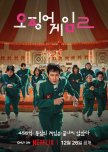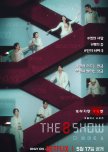
A Riveting Blend of Justice and Supernatural Forces
The Judge From Hell is an enthralling Korean drama that redefines the supernatural legal genre, delivering a spellbinding mix of courtroom drama, eerie suspense, and moral introspection. At its center is Park Shin-Hye, who shines in her transformative role as a demon judge seeking justice beyond human comprehension.Set as if it's a mockery of the current Korean justice system, Park Shin-Hye’s character, an enigmatic judge with demonic powers, emerges as a relentless force balancing the scales of justice. Her duality—a merciless arbiter of punishment and a vulnerable soul burdened by her past—creates a compelling narrative anchor. The drama explores themes of redemption, vengeance, and the blurred line between good and evil.
Park Shin-Hye delivers a career-defining performance, embodying the judge’s inner turmoil and steely resolve with magnetic intensity. Her transformation scenes, where her demonic powers manifest, are breathtaking and highlight her versatility as an actress. The supporting cast complements her well, particularly her demonic teams and the lead detective who pursues her, who add layers of moral complexity and emotional depth to the story.
Visually, the drama is a masterpiece. Dark, brooding cinematography and meticulous production design transport viewers to a hauntingly beautiful world. The special effects, especially during her own trial confrontations, are both chilling and visually stunning. The soundtrack further elevates the atmosphere, blending haunting melodies with pulse-pounding beats.
However, the series does have minor flaws. Some subplots involving secondary characters feel rushed or underdeveloped, and a few episodes in the middle stretch could have been tighter in pacing. Nonetheless, the climactic episodes more than make up for these shortcomings, delivering a thrilling and emotionally satisfying conclusion.
The Judge From Hell is a bold and imaginative drama that captivates from start to finish. Park Shin-Hye’s mesmerizing performance and the show’s unique premise make it a must-watch for fans of supernatural and legal dramas alike. It’s a haunting reminder that justice doesn’t always come from above—it can rise from the depths of hell itself.
Vond je deze recentie nuttig?

A Missed Opportunity
The much-anticipated second season of Squid Game has finally landed, and with it comes a medley of highs and lows, sharp twists, and bittersweet disappointments. While the first season was lauded for its unflinching critique of societal hierarchies and its deeply emotional narratives, Squid Game 2 feels like a diluted echo of its predecessor, stumbling under the weight of heightened expectations and the greed of corporate serialization.Let’s start with the brighter spots, dim though they may be in the overall shadow of the season. Gong Yoo’s increased presence is a genuine highlight. Every second he’s on screen feels electric, a masterclass in understated charisma that leaves the audience wishing for more. Though his screen time remains fleeting, it’s a testament to his talent that he manages to inject so much gravitas into what could otherwise be a throwaway role. Lee Byung-hun, reprising his role as the enigmatic Front Man, similarly commands attention with his characteristic poise. His layered performance adds a veneer of intrigue to a character that could easily have become a caricature in less capable hands.
Another pleasant surprise comes in the form of Jo Yu-ri’s acting debut. Her portrayal of a young contestant, desperate to secure a future for her unborn child, is one of the few emotional touchpoints of the season. Her earnest performance brims with authenticity, grounding an otherwise chaotic narrative with moments of genuine heart. It’s a promising start to what will undoubtedly be a flourishing career.
The new games, albeit fewer in number, manage to retain the macabre creativity that defined the series’ first outing. Bloodier and more ruthless than before, they are designed to shock and awe, keeping viewers on edge with their relentless brutality. These moments remind us of what Squid Game once stood for: a visceral critique of human desperation framed within a grotesque spectacle.
Yet, these few merits cannot mask the glaring flaws that plague Squid Game 2. Chief among them is the show’s blatant exploitation by Netflix, which opts to leave the season dangling on a cliffhanger. The bitter irony of a series built on critiquing capitalism’s excesses being reduced to a tool for corporate gain is almost laughable. Instead of a coherent, self-contained story, we’re left with an unfinished tale, a dangling thread that screams “watch the next installment” rather than providing any real closure.
The truncated format of only seven episodes does little to alleviate these frustrations. The first three episodes are bogged down by redundant exposition, rehashing familiar themes and setups from the first season. For returning viewers, this feels like a tedious exercise in redundancy, while new viewers are unlikely to be drawn in by such meandering storytelling. By the time the show finds its footing, it’s already rushing to an unsatisfying conclusion, leaving little room for the kind of emotional depth that made the marble game in season one such an unforgettable moment.
This lack of emotional investment is further exacerbated by a cast of largely forgettable characters. While Jo Yu-ri’s character shines, others are relegated to the sidelines, serving little purpose beyond cheap comic relief. Thanos, in particular, is a glaring misstep. His antics are grating and pandering, dragging the show’s tone into unwelcome territory. His eventual demise is less of a tragedy and more of a relief, a moment where the series mercifully spares us from further irritation.
Perhaps the most egregious sin of Squid Game 2 is its abandonment of what made Korean dramas so compelling in the first place: their commitment to telling a complete, satisfying story. Unlike Western series, which often stretch narratives thin in pursuit of longevity, Korean dramas traditionally pride themselves on tight, cohesive storytelling. The decision to end this season on a cliffhanger feels like a betrayal of this tradition, a move dictated not by artistic integrity but by the cold calculus of profit margins.
In the end, Squid Game 2 is a pale imitation of its predecessor. While it offers glimpses of brilliance in its performances and games, it’s ultimately undermined by a rushed narrative, underdeveloped characters, and the suffocating influence of corporate interests. The series has lost its edge, trading its incisive social commentary for the empty spectacle of a franchise being milked for all it’s worth.
If you’re able to overlook these shortcomings, Squid Game 2 might still be worth a watch for its fleeting moments of brilliance. But for those hoping to recapture the magic of the first season, you’re better off looking elsewhere.
Vond je deze recentie nuttig?

Yet Another Great Narrative Being Ruined by A Murder Plot
Korean dramas are often praised for their ability to blend complex emotions, engaging characters, and cultural depth into compelling narratives. Like Flowers in Sand attempts to achieve this by intertwining the world of Korean traditional wrestling (ssireum) with police investigations. However, while the drama has its moments, it ultimately struggles to maintain a cohesive identity, leaving viewers with a mixed experience.The standout element of Like Flowers in Sand is undoubtedly Jang Dong-yoon’s performance as Kim Baek-doo. As a ssireum wrestler contemplating retirement, Baek-doo is the emotional anchor of the series. Jang’s portrayal of a kind-hearted, optimistic character is both heartfelt and nuanced. Even though the ssireum aspect of the story is given limited screen time, these moments shine brightly, showcasing the drama’s potential to tell a unique and moving tale of resilience and community.
Opposite him, Lee Joo-myung delivers a strong performance as Oh Yoo-kyung, Baek-doo’s childhood friend and the drama’s leading lady. Returning to her hometown as an undercover detective, Yoo-kyung balances her professional seriousness with heartfelt interactions that capture her rekindled bond with Baek-doo. The chemistry between the leads is authentic, blending lighthearted banter with emotional depth to create a believable and engaging dynamic.
The supporting cast also contributes significantly to the drama’s appeal. Characters like Min Hyun-wook, Joo Mi-ran, Kwak Jin-soo, and Jo Seok-hee bring warmth and humor to the story. Their camaraderie and shared efforts to save the ssireum team add a layer of emotional depth. Despite some underdeveloped subplots, the ensemble’s chemistry helps keep the narrative moving.
One of the drama’s most compelling elements is its portrayal of ssireum. The traditional sport is beautifully depicted, highlighting its cultural importance and the human connections it fosters. These moments feel genuine and impactful, providing a glimpse of the drama’s potential had it focused more on this aspect.
Despite its strengths, Like Flowers in Sand falters due to its inconsistent storytelling. Marketed as a slice-of-life sports drama, it veers into police procedural territory, resulting in a tonal mismatch. The transition between the heartfelt ssireum narrative and the murder investigation is abrupt, leaving viewers disoriented and disengaged. Rather than complementing each other, these storylines compete for attention, with the less compelling murder plot ultimately dominating the narrative.
The murder storyline is predictable and poorly executed. By the second half of the drama, it takes center stage, sidelining the ssireum team’s struggles and the relationships that initially drew viewers in. The resolution of the investigation—revealing the rice cake shop owner as the culprit—feels like an afterthought. This twist lacks impact and undermines the tension built up over the episodes.
Another significant issue is the underutilization of side characters. While the supporting cast delivers strong performances, many of their subplots are abandoned or cut short to make room for the murder investigation. This lack of follow-through diminishes the emotional resonance of their stories and reduces their contributions to the overall narrative.
The drama’s pacing is another weakness. The initial episodes set up an engaging story, but the latter half drags as the murder plot takes over. This uneven pacing makes it difficult to stay invested, with the narrative losing momentum and coherence as it progresses.
It’s hard not to dwell on the missed opportunities in Like Flowers in Sand. The drama had the potential to be a heartfelt slice-of-life story centered around ssireum and the relationships it nurtures. Jang Dong-yoon and Lee Joo-myung’s stellar performances, combined with a talented supporting cast and the cultural richness of ssireum, could have created a memorable and meaningful series.
Unfortunately, this potential is overshadowed by the decision to prioritize the murder plot. The narrative’s lack of focus and its attempt to juggle multiple genres—comedy, thriller, romance—results in an identity crisis. Instead of excelling in one area, the drama spreads itself too thin, failing to leave a lasting impression.
Like Flowers in Sand is a drama that offers glimpses of brilliance but ultimately falls short. While it boasts strong performances, heartwarming moments, and a fascinating glimpse into the world of ssireum, these strengths are undermined by an uninspired murder plot, uneven pacing, and a lack of narrative focus. The result is a drama that’s both engaging and frustrating, leaving viewers longing for what could have been.
If the writers had chosen to focus more on the ssireum story and the human connections around it, Like Flowers in Sand could have been a standout slice-of-life drama. Instead, it’s a reminder of the pitfalls of trying to do too much at once.
Vond je deze recentie nuttig?

Hidden Love: A Drama of Contradictions
The Chinese drama Hidden Love attempts to weave a narrative of romance and self-discovery but often gets tangled in its own contradictions. At its core, it tells the story of Sang Zhi and her evolving relationship with Duan Jia Xu, her brother’s friend. While the show has its moments of brilliance, it is overshadowed by its uneven character dynamics and questionable romantic framing.One of the highlights of Hidden Love lies in its portrayal of Sang Zhi when she’s allowed to exist outside of her romantic entanglement. Scenes featuring her at work or interacting with her university friends showcase a capable and well-rounded young woman. These moments provide a glimpse into her potential as a character—confident, relatable, and grounded. Zhao Lu Si’s acting amplifies these moments with remarkable versatility. She has a unique ability to seamlessly navigate between emotions, shifting from joy to despair within a single scene. Her performance in emotional moments, particularly those involving her heartbreak, stands out as some of the drama’s most impactful.
Victor Ma’s portrayal of Sang Zhi’s brother, Sang Yan, is another strong point. The sibling relationship feels authentic, capturing the blend of rivalry and deep care that defines many sibling bonds. Sang Yan’s role as both a protector and someone Sang Zhi can be vulnerable with adds depth to their dynamic. The airport scene, where Sang Zhi breaks down in his arms after a painful heartbreak, is a testament to the emotional strength of their bond and remains one of the drama’s most memorable moments. It’s rare to see a sibling relationship portrayed with such nuance, and Victor Ma’s performance anchors these moments with sincerity. The drama’s soundtrack also deserves praise, with its catchy and well-placed OSTs enhancing many key scenes.
However, the strengths of Hidden Love are often undermined by its central romantic storyline. Chen Zheyuan’s portrayal of Duan Jia Xu as the male lead is underwhelming, lacking the charisma or depth needed to carry his character. Jia Xu himself is difficult to relate to—overly controlling, possessive, and prone to jealousy. These traits make him less of a romantic ideal and more of a cautionary figure. His dynamic with Sang Zhi is particularly troubling, as he continues to treat her like a younger sister even after they begin dating. This lingering brother-sister dynamic casts an uncomfortable shadow over their romance, making it hard to invest in their relationship.
The five-year age gap between the leads is not inherently problematic, but Jia Xu’s behavior exacerbates the discomfort. Having known Sang Zhi since her childhood, his inability to shift his perception of her from a child to a partner feels unsettling. It’s as if the drama is trying to force a romance without addressing the fundamental mismatch in their dynamic. This issue is compounded by Sang Zhi’s characterization around Jia Xu. While she’s shown to be articulate and mature in other settings, her behavior around Jia Xu regresses into exaggerated cutesiness and awkward stuttering. It’s a disservice to Zhao Lu Si’s talent, reducing her character to a caricature when she’s capable of so much more.
The romantic scenes between the leads suffer as a result. Instead of chemistry, there’s a persistent sense of dissonance, as if the characters are trapped in roles they can’t escape. Sang Zhi’s infantilized behavior and Jia Xu’s condescending attitude make it hard to root for them as a couple. The narrative’s failure to transition their dynamic from a brother-sister relationship to an equitable partnership leaves the romance feeling forced and unconvincing.
Ultimately, Hidden Love struggles to find its footing. Its strengths in sibling dynamics, emotional performances, and music are overshadowed by a central romance that fails to resonate. For viewers who can overlook the uncomfortable framing of the leads’ relationship, there’s a baseline romance story here. However, for those who can’t get past the persistent brother-sister dynamic and lack of authentic chemistry in the main couple, the drama’s flaws become impossible to ignore.
Hidden Love leaves much to be desired, despite its occasional moments of brilliance. The inability to convincingly shift the leads’ dynamic and the wasted potential of its talented cast weigh heavily on the drama.
A 5.5/10 feels apt for a show that sparks moments of promise but ultimately fails to deliver on its central premise.
Vond je deze recentie nuttig?

A Magical Journey That Falls Short
Korean dramas have often been a treasure trove of unique storytelling, but sometimes even the most ambitious projects can falter under the weight of their own aspirations. The Sound of Magic, featuring Choi Sung-eun, Hwang In-youp, and Ji Chang-wook, is a visually breathtaking but narratively uneven series that leaves you yearning for more depth and cohesion.At its heart, The Sound of Magic is an ambitious blend of coming-of-age drama, romance, and fantasy, all wrapped in a musical package. Choi Sung-eun and Hwang In-youp deliver remarkable performances as two teenagers navigating their angst while living in starkly contrasting social worlds. Choi’s nuanced portrayal of vulnerability and resilience perfectly complements Hwang’s brooding and complex interpretation of a character grappling with inner turmoil. Their chemistry is palpable, making their scenes emotionally charged and compelling.
Ji Chang-wook, as the enigmatic magician, is the undeniable show-stealer. His charisma lights up the screen, and his musical performance with Choi Sung-eun is nothing short of enchanting. Their duet captures the essence of magic and music, offering some of the drama’s most memorable moments. Ji’s ability to blend mystery and warmth makes his character an anchor in a series that often struggles to find its footing.
The visuals are undoubtedly one of the drama’s strongest assets. Each frame is crafted with meticulous attention to detail, from the dreamy lighting to the intricate set designs. The cinematography is breathtaking, effectively creating a whimsical yet poignant atmosphere. This visual splendor immerses viewers in a world where magic feels almost real.
However, despite its stellar cast and stunning aesthetics, The Sound of Magic is hampered by a rushed and uneven narrative. With only six episodes, the series struggles to give its plot and characters the time they need to develop fully. The pacing feels disjointed, with significant emotional beats and plot twists often undercut by the need to move quickly to the next event. By the end, the story feels lost, leaving viewers with more questions than answers.
The characters, while performed admirably, suffer from a lack of depth. Their motivations and arcs are underexplored, making it difficult to become fully invested in their journeys. This is particularly disappointing given the series’ thematic ambition to explore belief, magic, and human connection. Ironically, for a drama that repeatedly asks its audience to believe in magic, it seems unsure of its own magical premise.
The Sound of Magic is a bittersweet watch. It boasts magnificent performances, a mesmerizing musical core, and stunning visuals, yet falls short of delivering a cohesive and satisfying story. While its moments of brilliance are undeniable, they are overshadowed by its narrative shortcomings.
If you’re drawn to visually striking dramas with standout performances, The Sound of Magic might still be worth a watch. Just don’t expect the magic to last beyond the surface.
Vond je deze recentie nuttig?

The 8 Show: A Spectacle of Disappointment
Rarely does a television program manage to deliver such an unrelenting assault on the senses as The 8 Show. Marketed as a groundbreaking series promising innovation and thrilling entertainment, it instead reveals itself to be an insufferable amalgamation of lazy writing, uninspired performances, and downright baffling production choices. By the end of its interminable runtime, one is left questioning not only the judgment of those who greenlit this disaster but also their own decision to endure it.The most glaring flaw of The 8 Show is its sheer lack of identity. What does it want to be? A drama? A comedy? A surreal experiment in avant-garde storytelling? It attempts all of these without mastering any, resulting in a tonal Frankenstein’s monster that lumbers aimlessly from scene to scene. The plot – or what one generously calls a plot – is an incoherent mess riddled with gaping holes and unresolved threads. Characters are introduced only to be discarded moments later, and any semblance of a central narrative is buried under layers of needless subplots that go nowhere. Watching it feels less like following a story and more like wandering through a labyrinth designed by someone actively trying to get you lost.
Adding insult to injury, the acting is uniformly atrocious. It’s as if the casting team deliberately sought out performers with the least charisma and emotional range. Lead actor - whatever his name was - delivers his lines with the enthusiasm of someone reading a grocery list, while the supporting cast alternates between overacting and looking visibly confused about what they’re supposed to be doing. Chemistry between characters is nonexistent, which is especially damning in a show that tries (and fails) to rely on relationships and interpersonal drama as its core.
The show’s visual and auditory design does nothing to salvage the experience. The cinematography oscillates between pretentious slow-motion shots and amateurishly framed scenes that look as if they were filmed on a whim. Lighting choices are often inexplicably harsh, lending everything a cheap, soap-opera aesthetic.
Perhaps the most infuriating aspect of The 8 Show is its pretension. It struts around as though it’s the pinnacle of artistic achievement, but beneath its flashy exterior lies a hollow core. The dialogue is riddled with pseudo-intellectual drivel that attempts profundity but only achieves self-parody. Its "bold risks" are less daring leaps and more missteps into creative quicksand, dragging the entire production down with them.
The 8 Show is not just bad – it’s offensively bad. It’s the kind of entertainment black hole that sucks time, energy, and goodwill from anyone unfortunate enough to encounter it. There’s nothing redeemable here, no silver lining to be found. For the sake of your sanity, avoid this calamity at all costs. Just do yourself a favour and skip this garbage.
Final score: 1/10. Even that feels generous.
Vond je deze recentie nuttig?

"Light Shop: A Symphony of Spirits, Sorrow, and Stunning Visuals"
The Korean drama Light Shop is not just a ghost story; it’s an intricate mosaic of emotions, unraveling grief, vengeance, and redemption. This is a place where the living and the dead blur like shadows at twilight, and where pain has a pulse that reverberates beyond the grave. At the core of it, Light Shop offers viewers more than chills—it delivers heartbreak, artistry, and an unexpected depth wrapped in just eight episodes. Though brief, each moment is painstakingly crafted, like fleeting light caught in a prism.Let’s step into this spectral world, illuminated by a dazzling quartet: Park Bo-young, Seolhyun, Shin Eun-soo, and Ju Ji-hoon. These stars do more than shine—they burn, casting both warmth and darkness on a story that dances delicately on the edge of horror and tragedy.
Park Bo-young is the heart of Light Shop, and she plays it masterfully. If you’ve seen her in Daily Dose of Sunshine, you’ll recognize her signature tenderness and resilience here as an ICU nurse who can see spirits. Her character feels like a candle in a dark room, flickering between hope and despair, illuminating the fragile line between life and death. Park Bo-young breathes life into a role that could easily have been clichéd, infusing her character with a quiet strength and weary compassion that makes her ghost-seeing nurse feel achingly real.
Then there’s Seolhyun—a wronged lover turned vengeful ghost. She prowls through the scenes with a wrath that’s as cold as it is beautiful. And therein lies the paradox. Much like Kim Tae-ri’s ethereal presence in Revenant, Seolhyun’s undeniable beauty sometimes undercuts the terror of her ghostly rage. She’s too luminous, too statuesque; it’s like watching a porcelain doll attempting to shatter itself. Yet, her performance is still magnetic—her eyes glimmer with a haunting sadness, a whisper of vengeance that chills your bones even if it doesn’t make your blood run cold.
Completing this triad is Shin Eun-soo, a young talent who conveys vulnerability and strength in a subtle balance. She plays a high-school girl caught in a web of supernatural events without fully realizing the danger she’s in. Her innocence is the lens through which the drama’s darkest moments gain clarity.
Adding emotional weight to Shin Eun-soo’s storyline is the brilliant Lee Jung-eun, who plays her mother. There’s one scene—silent, wordless, yet deafening in its emotional impact—where Lee Jung-eun’s face alone tells a story so profound it feels like time itself holds its breath. In that moment, her grief is a stormcloud hovering just above her eyes, threatening to break but never quite falling. It’s pure, distilled brilliance.
Yet, the heart of the drama beats strongest through Ju Ji-hoon’s portrayal of the enigmatic Light Shop owner. His calm demeanor and sparing use of dialogue shroud the Light Shop in an aura of mystery, making the store itself feel like a sanctuary of secrets. When his backstory unfurls in Episode 7, it lands like a dagger cloaked in silk—a revelation that pierces deeply and lingers painfully. Ju Ji-hoon’s restrained performance adds layers of sorrow and wisdom to a character who holds the threads of fate in his hands, yet remains a prisoner of his own past.
The cinematography of Light Shop is a dreamlike experience, a visual symphony of light and darkness. Each frame feels like a canvas splashed with metaphors—some obvious, some whispering from the shadows. One standout moment that lingers in the mind long after the screen fades to black is the scene where Seolhyun’s character attempted to put her boyfriend’s back together. This scene was imposed on a n ECG waves flicker like fragile threads of life. It’s a stunning juxtaposition: the desperate attempt to hold on to love, to keep a fading heart beating against the cold inevitability of death. It’s poetry in motion, a metaphor so vivid you feel it pulse through your own veins.
Light and shadows play their own roles here, mirroring the story’s themes of fleeting hope and encroaching darkness. The colors shift, the shadows deepen, and each scene is carefully choreographed to blur the line between reality and the ethereal.
If Light Shop has a fault, it’s the brevity of its stay. At only eight episodes, each around 45 minutes (save for the 75-minute finale), the drama doesn’t leave much room for sprawling subplots or extensive character backstories. It’s like walking through a gallery and glimpsing masterpieces you wish you had more time to study. Yet, the creators know their canvas well, and what’s presented is honed to near perfection. There’s no fat on these bones; everything serves the story, and what the drama lacks in length, it makes up for in impact.
And that impact hits hardest in the final episodes. The plot twist arrives like a crack of thunder on a clear night, jolting the story into a new dimension of tragedy and catharsis. You think you know where Light Shop is taking you, but the destination shifts, and suddenly you’re left standing at the crossroads of heartbreak and hope.
Light Shop is a must-watch for fans of horror and the occult, but it’s also for those who appreciate stories that explore the raw, tangled emotions of love, loss, and the struggle to move on. It’s more layered than it first appears, like an old photograph developing slowly to reveal more than you expected. The drama may be short, but its impact is lasting. In a world where ghosts linger, memories haunt, and light fights to pierce the darkness, Light Shop is a beautiful reminder that even in grief, there’s a flicker of light—fragile, yet enduring.
Watch it, not just to be scared, but to feel every shadow and every flicker of hope. And bring tissues for the final episode. Because in Light Shop, every light tells a story.
Vond je deze recentie nuttig?

Two Broken Souls, One Healing Symphony.
There are moments in life when art transcends entertainment and becomes a raw, almost sacred experience. My Mister is one of those rare gems—a drama that grips you by the soul and doesn't let go, leaving you both shattered and whole. To call it a "masterpiece" feels almost reductive; it is a symphony of human emotion, a mosaic of pain and healing woven together with meticulous care and haunting beauty.The narrative of My Mister is a marvel of restraint and authenticity. Unlike many dramas that dive into theatrics for shock value, My Mister thrives in the mundane, in the quiet spaces where life truly happens. It doesn’t shout; it murmurs, inviting you to lean in and feel. You become a silent witness, a fly on the wall peering into lives teetering on the edge of despair. This grounded approach makes every scene deeply believable and achingly real. The struggles of Park Dong-hoon and Lee Ji-an are not exaggerated but distilled to their purest, most human essence.
Lee Sun-kyun's portrayal of Park Dong-hoon is nothing short of breathtaking. He embodies a man whose decency is slowly being smothered by the weight of life’s unrelenting burdens. You see his exhaustion in every sigh, every hesitant smile. He doesn’t just play the role; he lives it. His performance is a masterclass in subtlety, a portrait of a man who holds the world on his shoulders but dares not let it crush his soul completely.
On the other side of this emotional spectrum is IU, delivering a career-defining performance as Lee Ji-an. Her deadpan delivery, so meticulously restrained, becomes a canvas on which her torment is painted. Her eyes, hollow yet blazing with muted defiance, reveal a soul fractured but not yet obliterated. IU’s portrayal of Ji-an is like a whisper from the void, a reminder that even the broken can survive, and perhaps, heal.
But My Mister doesn’t hinge solely on its leads. The chemistry between every cast member is electrifying in its subtlety. Dong-hoon’s brothers—flawed, comical, and heartbreaking—add rich layers to the story. His wife, the bar patrons, the office colleagues, even fleeting characters—all feel like fully realized people with lives beyond the screen. This ensemble creates a web of interconnected pain and resilience that feels alive.
What makes My Mister particularly brilliant is its use of subtext. Critical plot points happen both in plain sight and in the shadows, urging viewers to piece together unspoken truths. The storytelling demands attention and rewards it generously. This is not a passive viewing experience; it’s an invitation to engage, imagine, and feel. For those who aren’t vigilant, the labyrinth of quiet nuances might seem confounding, but for those who invest, the payoff is pure gold.
The soundtrack is another triumph. Sondia’s Grown-Ups lingers like a ghost, perfectly encapsulating the bittersweet melancholy of the story. The music doesn’t just accompany the scenes; it breathes life into them, amplifying emotions that words dare not express.
If there is a flaw, it lies in the drama’s slow-burn pace. My Mister unfurls deliberately, patiently. Some may falter before the story's heart truly reveals itself. But for those who persevere, the experience is unparalleled—like watching a sunrise that starts as a murmur of light and crescendos into blinding brilliance.
In the end, My Mister is more than a drama; it is a once-in-a-lifetime narrative experience. It raises the bar so high that future stories may struggle to touch its shadow. The word masterpiece is overused, but here, it finds its rightful home.
This drama doesn’t just set a standard; it defines one.
Vond je deze recentie nuttig?




